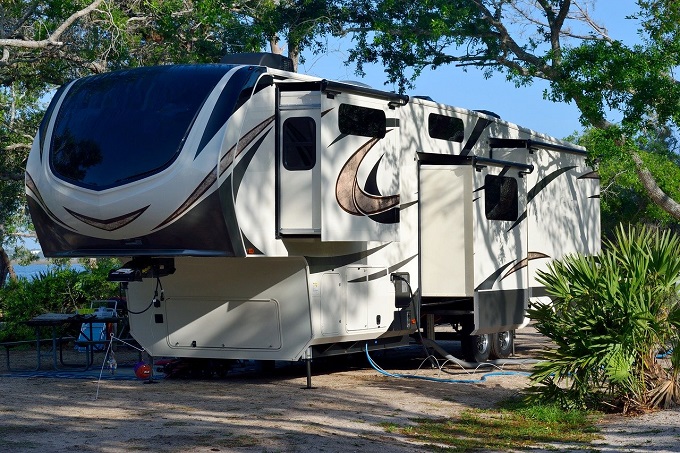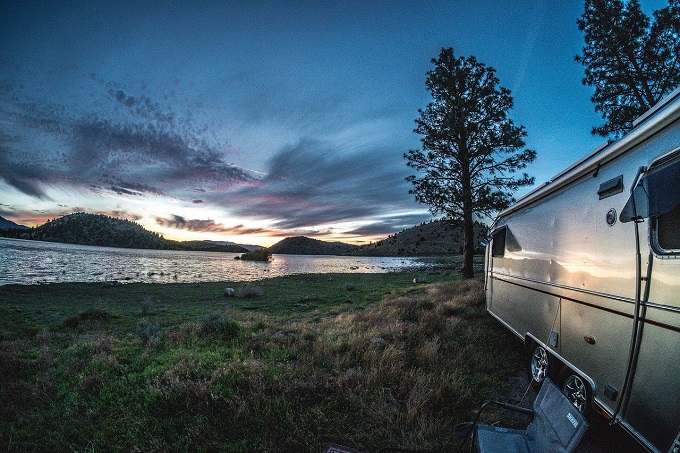When people find out that Shae and I are on a 5 year, 50 state road trip, one of the first questions we’re asked is “Do you have an RV?”
The answer is no.
I’ve always meant to write a post explaining why we made that decision and remembered recently that I’d never gotten around to doing that. So here are the reasons why we drive around in a 2004 Toyota Corolla and live in hotels and Airbnbs rather than traveling in an RV.

Money
The primary reason we don’t travel in an RV is due to how expensive it would be. There are a number of elements that come into play here, so here’s a list of the additional costs we’d incur. For comparison, we spent an average of $24.79 per night on hotels and Airbnbs in 2019 thanks to hotel points, discounted gift cards, Amex Offers, etc.
Initial Costs
It would cost us at least $10,000 to buy an RV, if not more depending on what size we wanted to get. That’s assuming we got one that you could actually drive. If we wanted a larger RV that had to be towed, we’d not only have to spend more on that, but we’d also need to buy a truck that was capable of towing it – even more upfront costs.
We have enough money saved up that we could buy an RV that’s on the cheaper end of things, but it would take a fairly big bite out of our savings. Buying a larger RV and a truck would involve taking on somewhat significant debt, something we don’t wish to do seeing as we finally got debt-free a few years ago after spending the first 10+ years of our marriage in debt.
Gas
The MPG of our car is 32 city / 40 highway whereas the MPG of RVs tends to be 10-20 MPG. Seeing as we’d likely be buying a used one, chances are that its MPG wouldn’t be quite as good.
We wouldn’t want to drive everywhere in an RV though, so we’d still likely want a car with us which would mean towing that, thereby making the RV’s MPG even worse. All this would probably mean we’d be spending a few extra thousand dollars a year on gas compared to our current gas expenditure.
Hookup Costs
It wouldn’t be realistic to boondock/dry camp/free camp around the country, so we’d want to stay at RV parks or campgrounds pretty frequently. Based on what I’ve seen, it seems like those cost an average of $30-40 per night. That’s more than we spent on accommodation per night in 2019 and that’s not even taking into account the cost of the RV in the first place, nor the gas, etc. When living in a hotel is cheaper on a per-night basis than paying for an empty space to park an RV, why would you want to do anything else?!
Maintenance
Considering we’d probably buy a used RV, our maintenance costs would likely be higher than if we bought a brand new one. Buying used means our maintenance costs would no doubt be higher. I’m also assuming that paying for RV repairs is more expensive than paying for car repairs due to the mechanic needing special expertise and parts costing more (and less easily available).

OK, so that’s just the finance side of things that discourages me from wanting to travel in an RV. There are all kinds of other factors that make me less willing to give up the creature comforts of living in hotels and Airbnbs.
Space
While the additional expense is the primary reason I don’t want to travel in an RV, one of the other main reasons is be the lack of space. We wouldn’t be able to afford a huge RV, so we’d be living in a fairly cramped environment year-round. I can imagine that getting claustrophobic, especially when we’re used to staying in more spacious hotel rooms, suites and Airbnb houses/apartments. RV living would provide some outdoor space, but I don’t know if that would make up for the cozy living conditions inside.
Internet
Shae and I both work online and so need a decent internet connection. Shae in particular needs a consistent connection and speed as she teaches online, so needs the bandwidth to support live video.
Internet doesn’t tend to be an issue for us at the moment, but living in an RV would mean we’d have to pay for a hotspot. There would no doubt be times we’d be staying at campgrounds without good internet access through the hotspot, so that would prove to be extremely problematic.
Maintenance
Neither Shae nor I are car people. We don’t know how to change the oil in our car and even manage to mess things up when replacing our windshield wipers.
If we bought an RV, we’d be even more clueless when it comes to maintenance issues. Some of those issues are things we could learn to fix in theory, but we’re already busy enough without adding more things to our plate.
Driving It
Shae and I have driven a U-Haul truck from one side of the country to the other. While that wasn’t terrible, driving a large vehicle like that was stressful at times. Permanently driving a vehicle larger than that would presumably be even more stress-inducing than that.
Air Conditioning / Heat
We tend to stay in the south in the winter and the north in the summer to ensure we have fairly temperate weather year-round. Despite that, we still inevitably stay in places that are cold in the winter and hot in the summer.
If we were staying at a campground or RV park with electricity hookups, this wouldn’t be much of a problem. If we stayed somewhere without electricity though, it would be far less comfortable.
Staying In Cities
While RVs can be great if you want to stay in National Parks and state parks, they’re not so good if you want to stay in cities. Staying in the parking lot of a Walmart or Cracker Barrel would be an option, but those don’t have the benefit of electricity or water hookups.
Truffles
Truffles is a very active dog and loves running around chasing after her ball. We have space for that in hotel rooms, but that wouldn’t be an option inside an RV. She can’t really be trusted off-leash outside, so it’s not like we can just have her run around outside the RV.

Those are the main reasons I’m not so keen on living in an RV, but there are additional perks which help explain why I like living in hotels and Airbnbs.
Hotel Status
Spending 250+ nights a year in hotels means we pick up hotel status with multiple chains pretty easily. While some of those status levels can be obtained by having a credit card for some hotel chains like Hilton and IHG, that’s not so possible with chains like Hyatt and Marriott. Hyatt Globalist status can be particularly rewarding with suite upgrades, club lounge access, a free night certificate for any Hyatt property worldwide and more. It would be a shame to pass up benefits such as those for any occasions when we did stay in hotels while living in an RV (e.g. when on vacation).
Free Food
Some hotel brands like Holiday Inn Express, Residence Inn, Hampton Inn, etc. offer free breakfast to all guests. Many other brands don’t, but we still get free breakfast anyway thanks to status.
Some properties have club lounges where snacks are offered during the day and hors d’oeuvres in the evening, while other brands like Staybridge Suites and Residence Inn offer complimentary dinner and alcoholic beverages three nights a week. That can help cut down on our food costs and gives us a bit more variety than eating cereal for breakfast and making dinner ourselves.
Final Thoughts
By being able to maximize hotel loyalty programs, we’re able to live in hotels and Airbnbs for less than $25 per night. Living in an RV would be significantly more expensive, add hassles like vehicle maintenance and provide fewer creature comforts.
While RV-living is no doubt a great option for some people – particularly families with kids. I’m sure there are other benefits too, like not having to pack and unpack all the time. However, there’s too much to like about living in hotels for me to want to give up that lifestyle.
Oh yes, I understand the costs of traveling around in an RV. My folks had two, first a very small one and then a larger and although they enjoyed riding around the US and Canada in them. they do have a lot of drawbacks. I noticed when they were in a campground and talked with other couples with RVs, the main topic was RV issues and getting them repaired. You do need to learn to do some repairs yourself as its not like taking your Toyota to a garage to be fixed. My folks were once stranded in a small town in Kansas for over a week while a garage waited on an obscure part for their RV. Another friend and her husband inherited an RV from his parents, took it on one long trip, decided this was not for them and sold the RV when they got home. After my folks decided they were too old to be driving far from home anymore, my dad would take naps in the RV when it was parked in their back yard. The RV has long been sold, hope the new owners are enjoying it.
Yep, the repairs would definitely be one of the most daunting aspects of owning an RV!